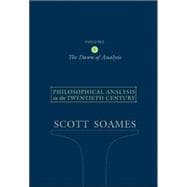
Note: Supplemental materials are not guaranteed with Rental or Used book purchases.
Purchase Benefits
What is included with this book?
| ACKNOWLEDGMENTS | ix | ||||
| INTRODUCTION TO THE TWO VOLUMES | xi | ||||
| PART ONE: G.E. MOORE ON ETHICS, EPISTEMOLOGY, AND PHILOSOPHICAL ANALYSIS | 1 | (90) | |||
|
3 | (9) | |||
|
12 | (22) | |||
|
34 | (37) | |||
|
71 | (18) | |||
|
89 | (2) | |||
| PART TWO: BERTRAND RUSSELL ON LOGICAL AND LINGUISTIC ANALYSIS | 91 | (104) | |||
|
93 | (39) | |||
|
132 | (33) | |||
|
165 | (17) | |||
|
182 | (12) | |||
|
194 | (1) | |||
| PART THREE: LUDWIG WITTGENSTEIN'S TRACTATUS | 195 | (60) | |||
|
197 | (17) | |||
|
214 | (20) | |||
|
234 | (20) | |||
|
254 | (1) | |||
| PART FOUR LOGICAL POSITIVISM, EMOTIVISM, AND ETHICS | 255 | (94) | |||
|
257 | (14) | |||
|
271 | (29) | |||
|
300 | (20) | |||
|
320 | (26) | |||
|
346 | (3) | |||
| PART FIVE: THE POST-POSITIVIST PERSPECTIVE OF THE EARLY W.V. QUINE | 349 | (60) | |||
|
351 | (27) | |||
|
378 | (28) | |||
|
406 | (3) | |||
| Index | 409 |
The New copy of this book will include any supplemental materials advertised. Please check the title of the book to determine if it should include any access cards, study guides, lab manuals, CDs, etc.
The Used, Rental and eBook copies of this book are not guaranteed to include any supplemental materials. Typically, only the book itself is included. This is true even if the title states it includes any access cards, study guides, lab manuals, CDs, etc.